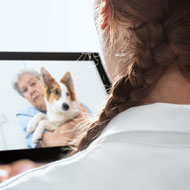Further work needed on telemedicine trial - RCVS Council

The trial will aim to assess the risks and benefits of remotely prescribing POM-Vs without a physical examination of the animal.
A telemedicine trial proposed by the RCVS is being referred to the Standards Committee for further development, following a vote at the most recent council meeting.
The trial will aim to assess the risks and benefits of remotely prescribing prescription-only veterinary medicines (POM-Vs), when there has been no physical examination of the animal.
A number of council members raised concerns about the potential animal welfare implications of the trial. Issues raised included how the provision of 24/7 emergency care and pain relief would be affected, the implications for antimicrobial resistance and how the trial could affect the definition of an animal ‘being under his or her care’.
Council members also discussed the potential benefits of telemedicine, such as extending the reach of vets and empowering clients. Additionally, as the technology is already developing, it is essential that the college remains on the front-foot.
The Standards Committee will now consider the points made, alongside the parameters and scope of the trial. A further consultation will also be carried out with a number of external stakeholders to inform a more detailed proposal, which will come back to council for discussion at a later date.
Amanda Boag, RCVS president, said: “This was a very important and necessary debate and I appreciate that passions were, quite rightly, very high in relation to such a fundamental issue as remote prescribing where an animal has not been physically examined.
“I appreciate all the contributions that were made and the Standards Committee now has a clear steer as to the further work it needs to conduct before bringing the proposed trial back to a future meeting of Council.”



 The latest
The latest